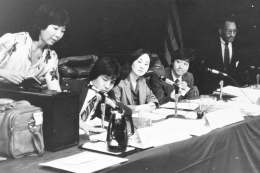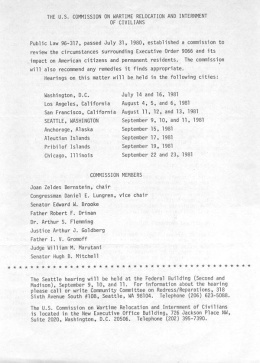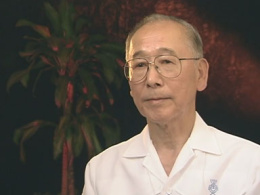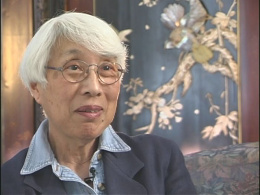Commission on Wartime Relocation and Internment of Civilians
Established in 1980, this bipartisan federal commission was directed by Congress to review the facts and circumstances surrounding Executive Order 9066 and its impact on American citizens and permanent resident aliens as well as Alaskan natives in the Pribilof and Aleutian Islands. To arrive at its findings, the nine-member federally appointed body held hearings in major U.S. cities and heard testimonies from more than 750 witnesses. Its conclusions were submitted in 1983 as Personal Justice Denied , a unanimous report that formed the basis for the Civil Liberties Act of 1988 granting wartime survivors a public apology, individual reparations of $20,000, and a public education fund.
Background
The notion of a federal commission to study the wartime exclusion began in the 1970s as a divisive issue in the Japanese American community. The Japanese American Citizens League led by activist Edison Uno began a call for reparations with a resolution introduced at its 1970 Chicago convention. As support for redress grew and the number of Japanese American legislators increased, the issue of whether to call for direct monetary payments or to establish a commission to explore the issue became the focus of national debate. Senator Daniel Inouye first proposed the idea of a commission at a meeting with JACL leaders and three fellow Japanese American members of Congress in January 1979. Members of the Seattle JACL chapter were strongly opposed, but the majority on the JACL's National Committee for Redress realized the commission's value as an educational and political tool. By August 1979, House and Senate bills were introduced by a bipartisan group of senators, led by Senators Inouye and Spark Matsunaga . In the meantime, a bill introduced by Congressman Mike Lowry calling for direct reparations payments and backed by those who opposed the commission course made its way through Congress but was quickly defeated. By mid 1980, the Senate and House overwhelmingly passed bills calling for the formation of the commission (with an amended Senate provision to investigate the Aleut Native Americans confined in southeastern Alaska at the urging of Republican Senator Ted Stevens of Alaska). The bill was signed into law by President Jimmy Carter in 1980.
Procedure
The commission was charged with investigating the facts and circumstances surrounding Executive Order 9066 on American citizens and permanent resident aliens, to review the directives of U.S. military forces pertaining to the detention to include Aleut civilians and permanent resident aliens of the Aleutian and Pribilof Islands, and to recommend appropriate remedies. [1]
Eleven hearings from July to December 1981 in ten cities, including Washington, D.C., Los Angeles, San Francisco, Seattle, Chicago, New York City and Cambridge, were held before a nine-member commission appointed by President Carter and members of the Senate and House. Chaired by Washington lawyer Joan Z. Bernstein , the commission included U.S. Commission on Civil Rights chair Dr. Arthur S. Flemming , former Supreme Court justice Arthur J. Goldberg , former Senators Edward W. Brooke and Hugh B. Mitchell , Reverend Robert F. Drinan , Father Ishmael Vincent Gromoff , and Judge William Marutani . California Congressman Daniel Lungren, who provided the sole opposition to monetary reparations, was vice-chair. Over the course of 20 days, more than 750 witnesses gave testimonies prepared with the help of the JACL and National Coalition for Redress and Reparations (NCRR), a grassroots organization founded as a result of the redress movement. Support was also given by the National Council for Japanese American Redress (NCJAR), an organization seeking redress through a class action suit. At the same time, commission staff led by Special Consul Angus Macbeth with the help of researcher Aiko Herzig-Yoshinaga conducted extensive primary research from the National Archives and other written material on the subject.
Specific Findings and Recommendations
In December 1982 the commission released a unanimous 467-page report titled Personal Justice Denied detailing the history and circumstances of the wartime treatment of people of Japanese ancestry and the people of the Aleutian Islands. It was found that the policy of exclusion, removal and detention was systematically conducted by the U.S. government despite the fact that no documented evidence of espionage or sabotage was shown, and there was no direct military necessity for detention. In fact, the broad historical causes were "race prejudice, war hysteria and a failure of political leadership." [2] The commission report also cited enormous material and intangible losses that were incalculable, including lost education and job training, loss of family structure, and prolonged racial stigma.
The commission enumerated five recommendations directed toward wartime incarceration survivors: (1) that Congress pass a joint resolution offering a public apology; (2) that the President pardon those convicted of curfew violations and review other wartime convictions based on discrimination due to race or ethnicity; (3) that Congress direct agencies to review applications for restitution of positions, status or entitlements lost as a result of wartime events; (4) that Congress appropriate monies to establish a foundation to address the nation's need for redress, including a fund for educational and humanitarian purposes beyond individual reparations; and (5) that Congress establish a fund to provide redress of $20,000 to each of the remaining 60,000 surviving persons of Japanese ancestry incarcerated during the war.
As to the Aleuts evacuated from their homes as a result of the Japanese invasion of the two westernmost Aleutian Islands, the commission recommended that Congress establish a $5 million fund for direct payments of $5,000 to the surviving evacuated Aleuts.
Impact
The findings of the CWRIC not only led to the passage of the Civil Liberties Act of 1988, they provided the synergy behind the coram nobis cases of Fred Korematsu , Min Yasui , and Gordon Hirabayashi which resulted in their wartime convictions being overturned. [3] Other efforts at redress were also buoyed by the commission's findings. Extensive media coverage and the publication of Personal Justice Denied provided invaluable educational lessons for the American public. Finally, it has been said that the impassioned testimonies of firsthand witnesses provided a much-needed "emotional catharsis" within the Japanese American community. [4]
For More Information
Boehm, Randolph, ed. "Papers of the U.S. Commission on Wartime Relocation and Internment of Civilians, Part 1: Numerical File Archives." Frederick, MD: University Publications of America, Inc, 1984. [Includes all of the documents used by the CWRIC in Personal Justice Denied.]
Commission on Wartime Relocation and Internment of Civilians. Personal Justice Denied: Report of the Commission on Wartime Relocation and Internment of Civilians . Seattle: University of Washington Press and Washington D.C.: Civil Liberties Public Education Fund, 1997.
Commission on Wartime Relocation and Internment of Civilians. Personal Justice Denied: Report of the Commission on Wartime Relocation and Internment of Civilians . National Parks Service.
Daniels, Roger, Sandra Taylor, and Harry Kitano, eds. Japanese Americans: From Relocation to Redress . Seattle: University of Washington Press, 1988.
Finding aid to CWRIC Los Angeles Hearings Video Collection, 1981. Visual Communications Archives and Media Library.
Hatamiya, Leslie T. Righting a Wrong: Japanese Americans and the Passage of the Civil Liberties Act of 1988 . Stanford: Stanford University Press, 1993.
Irons, Peter, ed. Justice Delayed: The Record of the Japanese Internment Cases . Middletown, CT: Wesleyan University Press, 1989.
Maki, Mitchell T., Harry H. L. Kitano, and S. Megan Berthold. Achieving the Impossible Dream: How Japanese Americans Obtained Redress . Urbana: University of Illinois Press, 1999.
National Archives and Records Administration. "Check the Commission on Wartime Relocation and Internment of Civilians (CWRIC) for Public Hearings and Testimonies (Record Group 220)." [Abstracts of witness testimonies and transcripts of public files.]
Tateishi, John. And Justice for All: An Oral History of the Japanese American Detention Camps . New York: Random House, 1984.
Yoshinaga-Herzig, Aiko and Marjorie Lee, eds. Speaking Out for Personal Justice: Site Summaries of Testimonies and Witnesses Registry from the U.S. Commission on Wartime Relocation and Internment of Civilians (CWRIC) Hearings 1981 . Los Angeles: Civil Liberties Public Education Fund and UCLA Asian American Studies Center Press. 2011.
Footnotes
- ↑ Commission on Wartime Relocation and Internment of Civilians, Personal Justice Denied: Report of the Commission on Wartime Relocation and Internment of Civilians (Seattle: University of Washington Press and Washington D.C.: Civil Liberties Public Education Fund, 1997), 455.
- ↑ Personal Justice Denied , 459.
- ↑ Peter Irons, ed., Justice Delayed: The Record of the Japanese Internment Cases (Middletown, CT: Wesleyan University Press, 1989), 4.
- ↑ Leslie T. Hatamiya, Righting a Wrong: Japanese Americans and the Passage of the Civil Liberties Act of 1988 (Stanford: Stanford University Press, 1993), 4.
Last updated Dec. 17, 2023, 12:12 a.m..

 Media
Media



